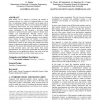Free Online Productivity Tools
i2Speak
i2Symbol
i2OCR
iTex2Img
iWeb2Print
iWeb2Shot
i2Type
iPdf2Split
iPdf2Merge
i2Bopomofo
i2Arabic
i2Style
i2Image
i2PDF
iLatex2Rtf
Sci2ools
132
click to vote
CASES
2003
ACM
2003
ACM
Exploiting bank locality in multi-bank memories
Bank locality can be defined as localizing the number of load/store accesses to a small set of memory banks at a given time. An optimizing compiler can modify a given input code to improve its bank locality. There are several practical advantages of enhancing bank locality, the most important of which is reduced memory energy consumption. Recent trends indicate that energy consumption is fast becoming a first-order design parameter as processor-based systems continue to become more complex and multi-functional. Off-chip memory energy consumption in particular can be a limiting factor in many embedded system designs. This paper presents a novel compilerbased strategy for maximizing the benefits of low-power operating modes available in some recent DRAM-based multibank memory systems. In this strategy, the compiler uses linear algebra to represent and optimize bank locality in a mathematical framework. We discuss that exploiting bank locality can be cast as loop (iteration space) and ar...
Related Content
| Added | 05 Jul 2010 |
| Updated | 05 Jul 2010 |
| Type | Conference |
| Year | 2003 |
| Where | CASES |
| Authors | Guilin Chen, Mahmut T. Kandemir, Hendra Saputra, Mary Jane Irwin |
Comments (0)

